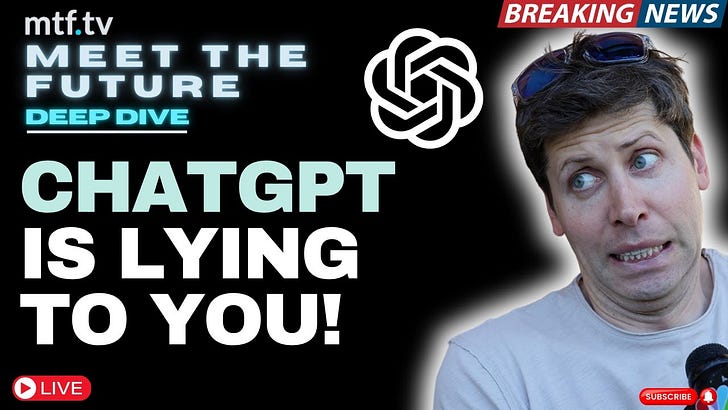mtf.tv's MTF NOW: Earth kicked out Solar System?... Iran's creepy robo-calls... AI hallucinations...
NOTABLE: YouTube Shorts Now Averages 200 Billion Daily Views, via The Wrap. Our shorts got 100K on our little channel last week. —> Subscribe to my YouTube channel here. THANK YOU.
📞🤖IRANIANS ARE GETTING BIZARRE ROBO-CALLS — INSTEAD OF THEIR FAMILIES’ VOICES. As Iran cut internet access this week, people calling mobile phones inside the country were met with eerie, AI-generated voice messages instead of real conversations.
—> 🗣️WHAT IT SAID: “Life is full of unexpected surprises,” the robotic voice tells callers. “The key is to discover the strength within us to overcome these challenges.” The 90-second message even invites listeners to close their eyes and imagine a place of peace.
—> 🛰️WHAT’S GOING ON: The calls began after Iran imposed a national internet blackout on Wednesday. With WhatsApp and other apps down, people turned to phone calls — only to reach these strange, pre-recorded monologues. Landlines weren’t affected. App-based calls didn’t trigger the message.
—> 🔒THE THEORY: Experts believe the calls are state-generated fallback messages — possibly part of Iran’s wider effort to control communications and censor outside contact. Others believe it’s a hastily activated auto-response system, preloaded with AI-generated filler.
—> 📵THE CONTEXT: Iran has a history of cutting off internet access during times of unrest, most notably during the 2022 protests. NetBlocks reports the latest blackout lasted over 62 hours — and even now, connectivity remains well below normal. Official updates have been conflicting.
Source: CNN
hello, future. it’s me, kev.
…and this is a dispatch from the digital frontier. It’s time to meet the future NOW — with the latest on markets, tech, and freedom. The day is 173. The year is 2025. The planet is Earth.
The planet has complete 47.4 percent of its orbit around the Sun. My name is Kevin Cirilli —> LinkedIn. Spotify. Sign-up to receive the future in your inbox here.
Back to the future...
SPACE
🪐🔥 THERE’S A 40% CHANCE A GIANT HIDDEN PLANET IS LURKING IN OUR SOLAR SYSTEM. For years, scientists have searched for a mysterious ninth planet tugging on the edges of our cosmic backyard. Now they’ve found their best lead yet — not by looking for light, but by tracking heat.
—> 🌡️ THE TECH: A team used Japan’s AKARI infrared space telescope to scan deep space for Planet Nine’s thermal glow — and spotted two promising blips. Because heat fades slower than light at distance, this new method could be our best shot at finding something that doesn’t want to be found.
—> 💥 THE BIG IDEA: Planet Nine could be 5–10x Earth’s mass, orbiting up to 800 times farther from the Sun. Its gravitational pull might explain the bizarre clustering of icy objects in the Kuiper Belt. If it’s real, it rewrites our understanding of how solar systems form — and survive.
—> 🧊 THE QUESTIONS: What if it's not a planet — but something stranger? Can we prove it’s moving? And if we do find it... does that mean our solar system was never fully mapped to begin with?
Sources: Phys.org, Daily Galaxy
QUANTUM // ARTIFICIAL INTELLIGENCE
🧠🌪️ AI HALLUCINATIONS ARE GETTING WORSE — EVEN AS AI GETS SMARTER. OpenAI’s newest models are powerful — but they also make things up nearly half the time. That means fake facts, fake links, fake answers… delivered with total confidence.
—> ❓WHAT’S AN A.I. HALLUCINATION? An A.I. hallucination is when a chatbot gives you an answer that sounds real — but isn’t. It might make up a medical study, quote a law that doesn’t exist, or give you a step-by-step solution to a math problem that totally falls apart. It’s not lying. It just doesn’t know better.
—> 📊 THE NUMBERS:
OpenAI’s older model (o1): ~20% hallucination rate
Newer models (o3 + o4-mini): 33% and 48%
So yeah — AI is improving in logic… but getting worse at staying accurate.
—> 🔍 WHY DOES THIS HAPPEN? AI doesn’t pull facts from a database. It doesn’t “know” anything. It’s a large language model (LLM) — which means it’s trained to guess the next word based on patterns in massive amounts of text. That’s powerful for creativity — writing songs, solving weird problems, or imagining new ideas. But it also means every answer is a remix, not a verified fact. The more complex the question, the more likely the model fills in gaps with something that sounds right but isn’t. That’s a hallucination.
Researchers are trying to fix it by:
Plugging AI into real-time, external data
Forcing models to “show their work” step by step
Teaching them to flag uncertainty
But even with all that, hallucinations are hard to fully stop — especially in creative or open-ended tasks.
—> 🚨 WHY IT MATTERS: In casual conversation, a hallucination might be funny. In healthcare, law, or finance? It’s dangerous. And because newer models hide their mistakes better, users often don’t know they’re being misled.
Source: OpenAI | Live Science
HEALTH
🧬👶 ENGLAND TO MAP EVERY BABY’S DNA — WELCOME TO THE ERA OF BIRTHDAY GENOMICS. By 2030, every newborn in England could have their entire genome sequenced at birth — turning the UK into the first country to make full-DNA screening standard care.
—> 🧪 THE TECH: Using umbilical cord blood, doctors will scan for 200+ rare conditions — including muscular dystrophy, sickle cell, metabolic liver disorders, and immune deficiencies. Many are deadly if missed early. Current NHS newborn screening only checks for nine conditions. This? Thousands of data points from day one.
—> 💰 THE PLAN: Backed by a $825M investment, the UK government says this will “leapfrog disease” — shifting health care from treatment to prevention. It builds on a 100,000-baby pilot and aims to build one of the largest genomic databases in the world.
—> 🧬 WHAT ABOUT THE U.S.? American babies get a heelprick test screening for 30–60 conditions depending on the state — but not full-genome sequencing. The U.S. is watching the UK closely. NIH-backed pilot programs like BabySeq are exploring next steps, but there’s no nationwide rollout (yet).
—> 🚨 THE PUSHBACK: Critics warn there aren’t enough genetic counselors to interpret these results for parents. Privacy experts raise alarms about lifetime DNA data — who stores it, who accesses it, and what happens if it’s used to profile future health or risk.
—> 🧠 THE QUESTIONS: Can this really scale? Does early knowledge empower families — or overwhelm them? And who gets to decide what’s “worth knowing” before a child can speak?
Source: BBC
ROBOTS
🦟🤖 CHINA UNVEILS MOSQUITO-SIZED DRONES FOR THE BATTLEFIELD — YES, REALLY. The Chinese military just showed off a drone so small it can perch on your finger. Built for covert ops, surveillance, and recon missions, this bionic microbot flaps its wings like a real insect — and hides like one too.
—> 🕵️ THE TECH: Developed at China’s National University of Defence Technology, the insect-like drone features flapping leaf-shaped wings and thread-thin legs. It’s designed for tight urban spaces, battlefield intel, and special operations where invisibility is the mission. Think spy drone, not spy balloon.
—> 🔍 THE CONTEXT: This is part of a global arms race in microdrones. The U.S., Norway, and others are racing to miniaturize surveillance with devices like the Black Hornet (used by NATO) and Harvard’s RoboBee (which can transition from water to air). The Pentagon’s even funding palm-sized UAVs — though China may have just leapfrogged the field.
—> 🧠 THE QUESTIONS: What happens when drones are too small to see — or hear? Who controls them? And in a world where warfare is shrinking, are we prepared for battles fought by things the size of bugs?
Sources: Interesting Engineering, SCMP
ONE MORE THING
🌍💥NEW STUDY SAYS EARTH COULD BE KICKED OUT OF THE SOLAR SYSTEM — BUT NOT FOR A LONG TIME. Scientists ran thousands of computer simulations and found that a passing star could someday mess with Earth’s orbit — and even fling us into deep space.
—> ⏳WHEN IT COULD HAPPEN: This wouldn’t be anytime soon. The study looked at what might happen over the next 5 billion years. The risk is small — about 0.2% — but it’s higher than we thought.
—> 🌟WHAT’S THE CAUSE? If a star passes close to our solar system, its gravity could pull on the planets. That small tug could throw off their orbits. Over time, those changes build up — and Earth could get caught in the chaos.
—> 🔭OTHER PLANETS AT RISK:
Pluto has a 5% chance of going unstable.
Mercury becomes 50–80% more likely to crash or fall into the Sun.
Even Mars has a 0.3% chance of being ejected or colliding.
—> 🚀WHY IT MATTERS: We often think of space as still and safe — but it’s not. Our solar system is moving through the galaxy, and stars can pass closer than we expect. This study shows that the future of Earth’s orbit isn’t guaranteed forever.
Source: Icarus
With gratitude,
Kev
ABOUT mtf.tv’s meet the future: mtf.tv’s meet the future is a cutting-edge platform focused on addressing key challenges at the intersection of national security, technology, and business. With a mission to embrace freedom to meet the future’s challenges and opportunities, mtf.tv offers forward-thinking media offerings and forums.







Go with the black T shirt.
love the dna and mesquito drones.